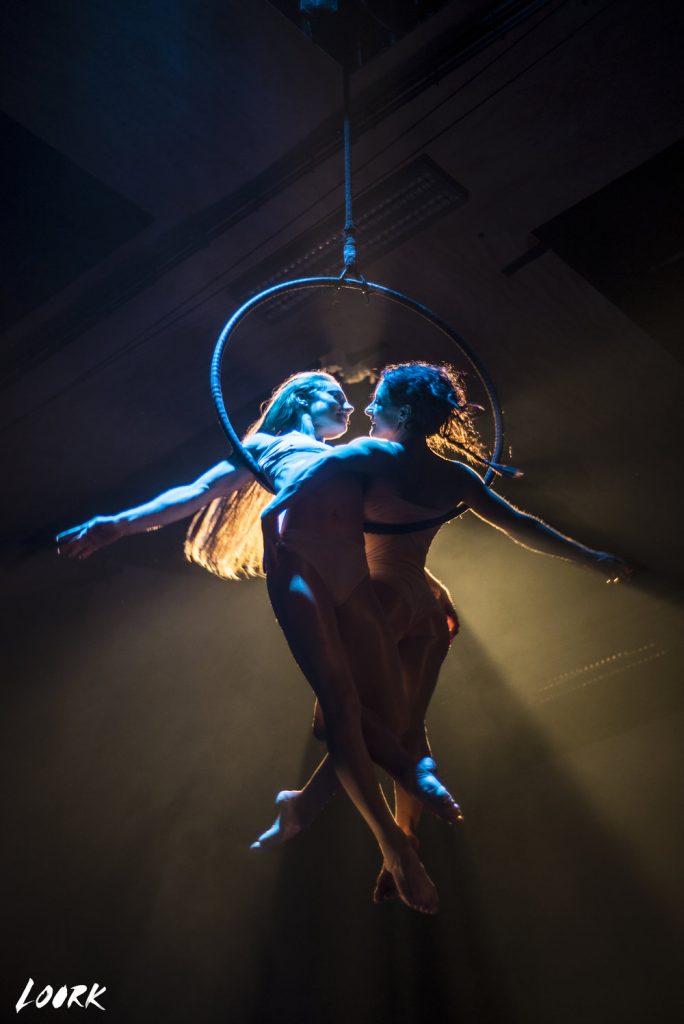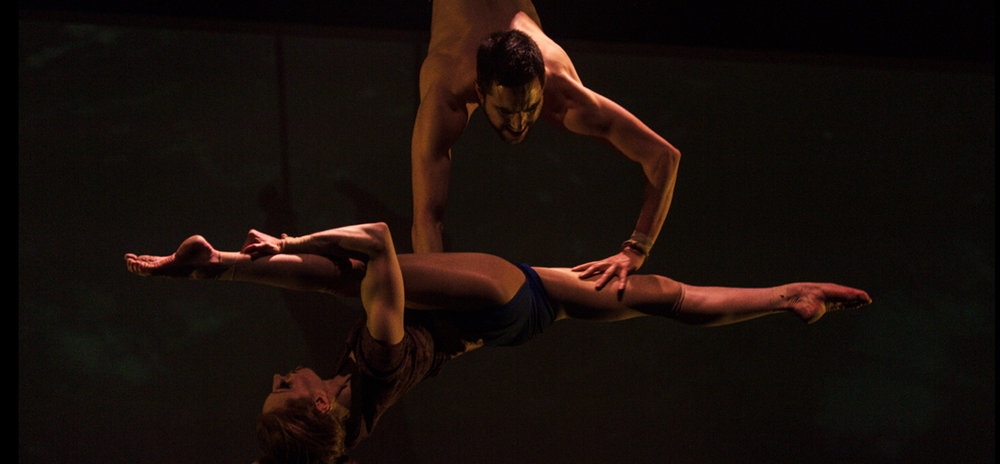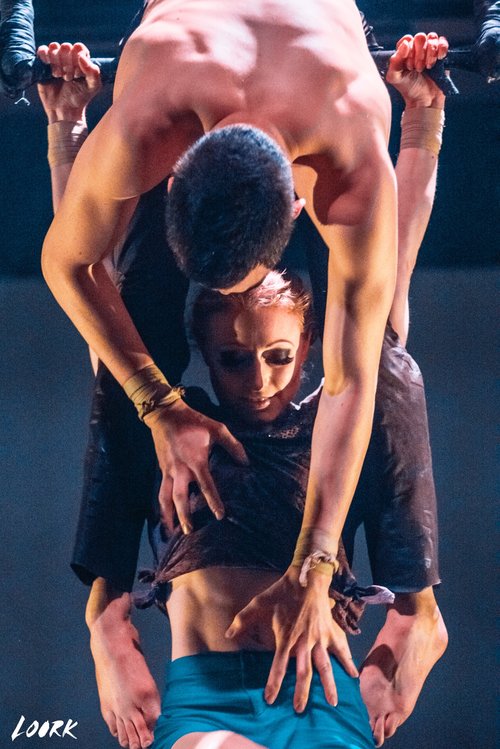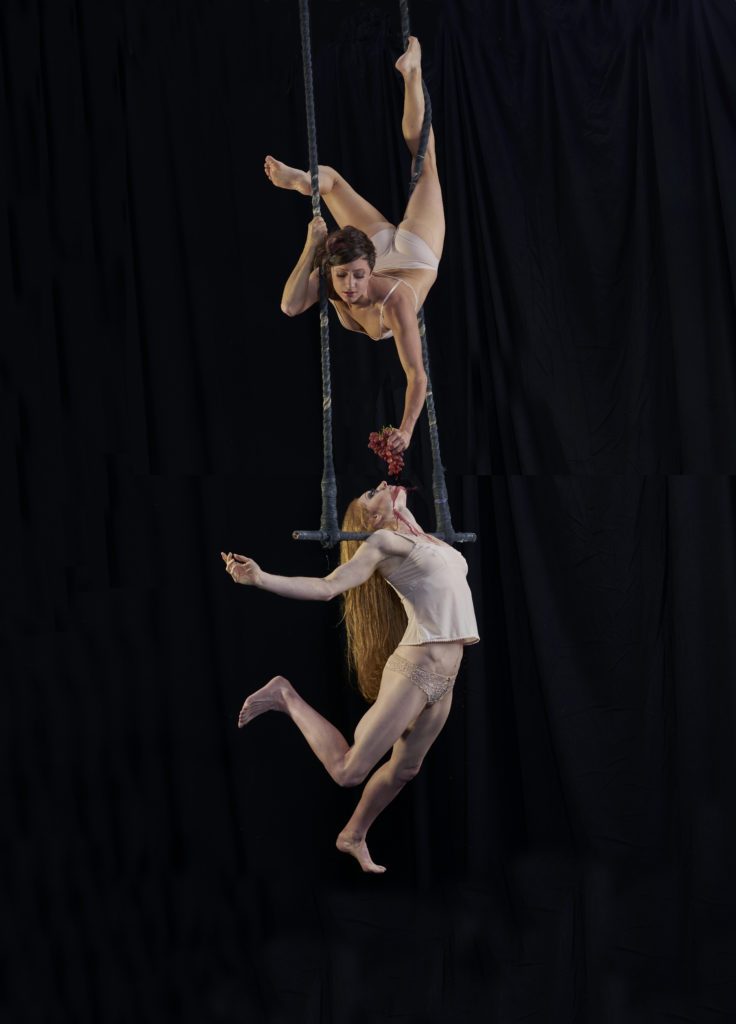
Credit: Loork
At the York Theatre until October 14, 2017
604-251-1363/thecultch.com
Posted October 4, 2017
Breathtakingly beautiful. Heart-stoppingly romantic. Stirringly erotic. Presented by The Cultch, the seed planted in Christina Rossetti’s 1862 poem Goblin Market ripens in The Dust Palace’s (New Zealand) re-imagining of the poem.
Rossetti’s lush language finds its parallel in bodies beautiful, glorious – sometimes ear-shattering – music, dazzling lighting effects, startling video projections including snatches of Rossetti’s poem, song, spoken word poetry, pas de deux of immeasurable loveliness and, of course, symbolism: specifically, the orange. Not like the apple Eve plucked from the Tree of Knowledge but the fruit from a tree of knowledge of a different sort: sensuality. The roots of this envisioning of Rossetti’s work are less biblical, more bacchanalian.
This is theatre-circus with gravity-defying acts on silks, ropes, rings, trapeze and balance board. On the relatively small stage of the York – unlike Cirque du Soleil under the big top – the aerials and body-bending acrobatics are almost in your lap.

It’s definitely worth reading the poem before seeing The Goblin Market but it’s not essential. In the original, two sisters – Lizzie and Laura – hear ‘goblin merchants’ offering their wares: “Come buy our orchard fruits/Come buy, come buy”. The young women are promised “plump unpecked cherries”, “bloom-down-cheeked peaches” and “wild free-born cranberries.” Instinctively, the “maids” initially resist but Laura lingers and, in exchange for a lock of her golden hair, samples the goblins’ fruits and then begins to wither away. Except for sister Lizzie’s intervention, Laura is doomed: “Till Laura dwindling/Seemed knocking at Death’s door”.
Rossetti was a devout High Church Anglican who, from the age of nineteen, suffered from depression. Twice engaged, she never married but spent her life writing and caring for her aged parents. The message of the poem is fairly obvious: the world of the senses is a wicked world and those who embrace it are damned. The irony of her long poem, however, is that the language and passion inherent in it makes sensuality so attractive it almost argues the contrary: “Sweeter than honey from the rock/Stronger than man-rejoicing wine/Clearer than water flowed that juice/She never tasted such before.”
Created by Eve Gordon and directed by Mike Edward, The Goblin Market takes a more feminist approach than the poem: the time is the present and Laura (Rochelle Mangan) and Lizzie (Eve Gordon) may or may not be sisters. We meet them against a b/w projection of a busy highway; on a suspended plank, they appear to be on an overpass and just hanging out together. Enter ‘the goblin’ (Edward Clendon) – lithe and lean, handsome and charming, but wicked, fickle and dangerous. He carries a briefcase full of oranges that at one point turn into white powder with the implication that he is a drug-dealing lothario.

The story progresses through aerials and acrobatics to its redemptive and highly homoerotic conclusion – intimated by Rossetti but finding full flower here with Mangan and Gordon entwined in a suspended hoop: wrapped around each other, reaching and reaching out, then ecstatically slipping together, sometimes appearing to be one body. The poem’s words find staggeringly beautiful physical equivalency: “Golden head by golden head/Like two pigeons in one nest/Folded in each other’s wings/ They lay down in their curtained bed/ Like two blossoms on one stem/Like two flakes of new-fallen snow/Like two wands of ivory”.
There were times opening night that I thought my heart would burst from such beauty: image and sound so sensually blended. But there were also times when, despite the mind-blowing physical skills of the performers, I wanted more poetry, less circus. Adding to this sensation was the applause that – as in all circus acts – erupted after each individual performance. I wanted the marriage of circus and theatre to be seamless and it isn’t.
That being said, The Goblin Market is a highly imaginative, visceral re-imagining of a work of literature. Of the poet, Virginia Woolf had this to say: “. . . she was about as good as poetesses are made since Sappho jumped” [committed suicide]. The reference to Sappho, that symbol of love and desire between women, suggests Woolf’s reading of Goblin Market was much the same as the creators of this production: not so much a cautionary tale about sensuality but a celebration of homoeroticism, specifically lesbianism. Hard to say what deeply religious but possibly sexually repressed Rossetti would make of The Goblin Market but she would undoubtedly be impressed by its sensuous, luxurious, visual and aural feast – the perfect counterpart to her sensuous, luxurious language.


